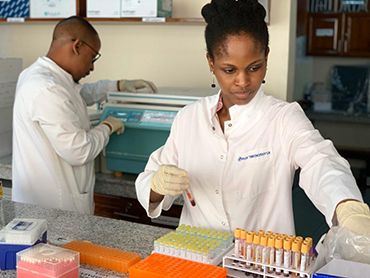SEREN: Improving blood-related diagnostics in sub-Saharan Africa
A new social enterprise is offering low-cost, easily accessible testing to diagnose blood and other diseases in sub-Saharan Africa.
(Credit: Professor Anna Schuh) Improving blood-related diagnostics in sub-Saharan Africa - SEREN .
Improving blood-related diagnostics in sub-Saharan Africa - SEREN .
Blood diseases are a major health problem in sub-Saharan Africa. Thirty percent of the population carry genes for inherited anaemia and the region accounts for 90% of childhood blood cancers (lymphomas).
‘Effective and affordable treatments are available, but limited diagnostic capacity means that those affected are not easily identified,’ explains Professor Anna Schuh of Oxford University’s Oncology department. ‘Historically, the diagnostic process requires expert staff and high-tech equipment; interpreting tests is slow and expensive, and blood data often needs to be sent overseas to be analysed.’
But a new social enterprise, based at the Muhimbili University for Health and Allied Sciences (MUHAS) in Dar-es-Salaam, Tanzania, is now offering low-cost, low-maintenance tests which could prevent the deaths of thousands of children and young adults in the region.
The initiative was facilitated by Schuh, building on 15-years’ experience developing genetic tests for blood diseases and cancer, after her first visit to Africa in 2017 to train doctors to become specialist haematologists like herself. ‘I realised that what we’re doing in the UK is chipping away at the edges with more personalised testing which improve outcomes for a few people,’ she explains. ‘Important as that is for those individuals, the trip made me see that developing diagnostic services in areas where these are scarce has the potential to transform millions of lives.’
The new facility, SEREN, (in the Maasai language, the place where the land runs on for ever) will offer tests for as little as US$10, while cloud-based data systems allow remote analysis by experts so that samples do not need to be sent abroad. Funding from those that can afford services enables SEREN to offer testing more widely to those that are not able to pay.
The Oxford-MUHAS partnership is continuing to develop new tests and services for SEREN all the time. Low-cost diagnosis for inherited anaemia from dried blood spots (cheaper than the current protein-based screening methods) offers the chance for comprehensive neo-natal screening. A system to obtain consent for storage of samples for future research is creating a DNA bank, which could be the foundation of a future East African Genomics Programme.
A key aim of the project is to build local capacity and ensure sustainability of the service. To prepare for the transfer of all testing to SEREN, Oxford has provided training for laboratory technicians and health professionals from five hospitals in Tanzania and Uganda. ‘These colleagues are all already extremely knowledgeable and very motivated,’ says Schuh ‘but we help with technical training and support in problem solving.’
‘SEREN is a hugely exciting model for the development of low-cost, sustainable DNA diagnostics that can be applied to other areas of medicine – and to more low-income countries,’ she continues. ‘We’ve leapfrogged conventional testing methods to adopt second- and third-generation approaches, which makes our processing state-of-the-art. Innovation can be easier where there is no history or assumptions about doing things a certain way and I’m constantly awed by my colleagues’ ambition to create a first-rate diagnostic facility!’
‘The vast majority of humans on the planet are currently excluded from the gains in modern medicine,’ Schuh adds. ‘Sharing developments in diagnostic testing, and building local skills to deliver these, offers potential to transform health outcomes in Africa and across the world.’
Professor Anna Schuh is Director of Molecular Diagnostics at the Department of Oncology, University of Oxford, and Honorary Consultant Haematologist
Funders:
- Wellcome Trust
- SE2020
- MLSTF
- NIHR (Global Health RIGHT grant)
- Illumina (in-kind contribution)
- Oxford Nanopore Technologies (in-kind contribution)